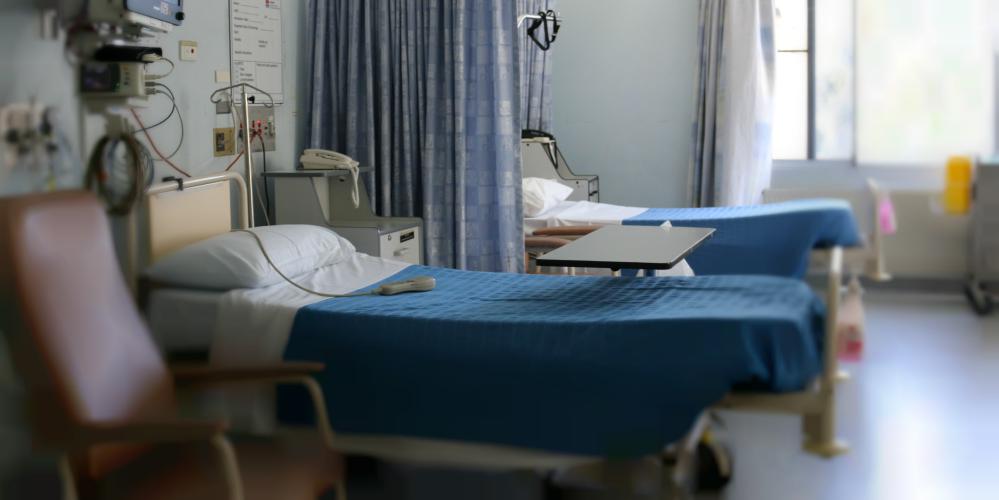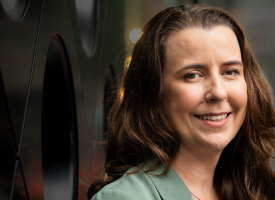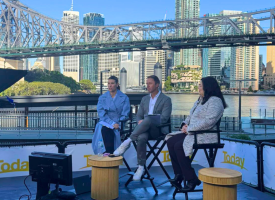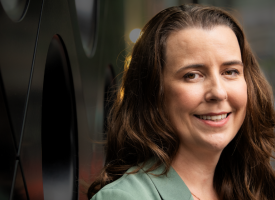Dr Khorshid on health care crisis, funding and workforce shortages
Transcript: AMA President, Dr Omar Khorshid, Parliament House doorstop on Thursday, 16 June 2022

Subject: Healthcare crisis, extend Commonwealth COVID-19 funding, new approach to hospital funding and healthcare workforce shortages, COAG and National Cabinet secrecy. Investment in health is an investment in future prosperity.
AMA PRESIDENT DR OMAR KHORSHID Today, we are at a crisis point in healthcare and there's a critical opportunity in the next couple of days for Australia's leaders to draw a line in the sand and to seize the opportunity to once and for all fix our health system.
The hospital system is in crisis, that is acknowledged by all state and territory leaders, and the National Cabinet meeting on Friday is the opportunity where we can see governments start to work together to resolve this situation. That means acting immediately to recognise that COVID is still here. COVID has not gone away. It is the virus that could not be named as a result of the recent election, but we've got to get back to how we manage COVID in the community. We must make sure that more Australians get their COVID vaccines, that more Australians get their flu vaccines to take the pressure off the health system. And we need a new advertising campaign from the Federal Government in conjunction with the states to make sure that more Australians make the right decisions for their healthcare.
We critically need an extension of the funding arrangement for COVID that the Commonwealth has put forward as a result of the pandemic. The National Partnership funding is critical to the running of our hospitals today, and even with that funding they are struggling in an unprecedented way. That funding must be continued and we cannot see a cut to hospital funding as a result of time passing in September, which is currently what will occur unless there's a new decision from the Albanese Government.
What we really need in the longer term is a new approach to hospital funding and a new approach to reform of healthcare, including general practice reform. That is something that we spoke a lot about during the election campaign, and now we have the opportunity for the new government to show how it can work together with the states to deliver for Australians' health. That means better funding and reform of primary healthcare, but of course it's not primary healthcare's failures that are leading to our hospital crisis. We have a hospital crisis because of a lack of investment for many years in those hospitals, because of COVID on top of that. And of course, now we also have a workforce crisis. So those issues all need to be dealt with independently.
We must address COVID, we must address the funding crisis in hospitals and the lack of investment. And of course, we need an urgent approach to the health workforce so that we can bring more trained health workers into the country, so that we're training enough health workers here to meet the future needs of Australians as we continue to age.
This opportunity to demonstrate that Australian governments can work together is one that I think must be taken by the Albanese Government, must be taken by each of the state premiers. And of course the states cannot be left off the hook here. They do run our hospital systems. They are responsible for the fact that ambulances are ramped outside hospitals, that Australians are dying, waiting for ambulances to attend our home, and Australians who do attend an emergency department of course are waiting far longer than they should be for their healthcare.
Our state premiers are responsible for the fact that elective surgery waiting lists are the longest that they have ever been. They must be part of the solution and not simply pass all the blame onto the Commonwealth. And we'd like to see a new approach, an end to the blame game which Kevin Rudd claimed would occur under his leadership all those years ago, back in 2007. Here we are today in 2022 with the blame game alive and well, but an opportunity for Anthony Albanese, for Mark Butler, for our state premiers and our state health ministers to show Australians that they can work together and deliver a new future for healthcare.
QUESTION: Is it disappointing that there's no signs the Commonwealth will do anything except extend the temporary 50-50 COVID funding? And if that's all you get out of tomorrow's meeting, how long should they extend that for?
OMAR KHORSHID: An extension of the 50-50 funding, the extra money for COVID to help the hospital system cope with COVID is absolutely critical, and we are confident that that will be the decision of National Cabinet and of our national government tomorrow. That, of course, isn't enough, but it's a critical first step, because without that our hospitals will of course suffer even worse outcomes when it comes to the end of that agreement in September. It cannot happen and we very much expect that the government will do the right thing.
The other critical things that must be done now are an approach to workforce. We need healthcare workers. Of course, we need workers in other industries as well. We've got to make sure that we don't have barriers in place, whether it be the number of visas available, be it the time it takes to process visas, be it the cost associated with moving to Australia and joining our workforce. Those issues need to be dealt with urgently, and of course we need to make sure that our governments are giving Australians a very clear message on their vaccination status, on their critical need for the third dose. It's not a booster, it is a third dose to give you long term immunity. We must get that rate up as high as we can so that our health system has got some chance of coping for the rest of this winter and of course, going forward.
The other issues are long term. They are going to require detailed negotiations between state and federal governments. We don't expect them to happen in the first meeting of National Cabinet. But wouldn't it be great if there's a strong message that the two levels of government are going to work together, they are going to move towards a new funding arrangement that will set our hospital system up for a sustainable future?
QUESTION: Would you be satisfied if the National Cabinet signed off on the extension of the COVID funding, say, to the end of this year, as opposed to until the end of June next year, which is what the states are calling for?
OMAR KHORSHID: I think any extension to the National Partnership Agreement needs to be for long enough for the states to be able to plan their workforce, their systems. And a year-long extension makes a lot more sense than a shorter extension. And COVID's going nowhere. We know we're going to be living with COVID for the foreseeable future, and our governments need to accept that, to build that into their plans and to build it into the funding model.
QUESTION: What's your impression of how prepared the new government is for the coming challenge in winter with influenza and COVID? In your talks with Mark Butler, are you impressed at his approach, new in the job?
OMAR KHORSHID: I've been lucky enough to meet with Mark Butler since his appointment as Health Minister, and I am confident that he is across the urgent need for reform in our health system and of course the challenges that face our whole health system this winter. Of course, the solutions aren't easy, and that's where the rubber's got to hit the road. That's where he and other participants, the state health ministers, have to make potentially difficult decisions in an environment where we know there isn't free money available. The government is in enormous debt and it can't just throw money at every problem. But on the flip side, the consequence of underinvestment in health is very real. It is being expressed in the lives of Australians. Lives lost needlessly, and that is a situation in our country that is unacceptable. And if governments can't afford to invest in health properly, to give us the minimum level of healthcare that we all expect, then we might need to look at increasing taxes, look at revenue, look at doing whatever needs to be done to ensure that Australians' healthcare is properly looked after going forwards.
QUESTION: Australia's got record COVID cases, but the health advice and the restrictions seem to be moving in the other direction - less restrictive, masks coming off in airports. Do you think that's moving in the right direction or should we be considering further restrictions before winter, such as more use of masks?
OMAR KHORSHID: We need our governments to accept the fact that COVID is not ended, the pandemic has not finished, and it's going to have a continuing impact on our society, on our health system, on our lives for the foreseeable future. They must be giving very clear messages to Australians about what we can do to do our bit, to make sure that we survive as best we can, as healthily as we can, and with the least impact on the health system as possible. That of course means high levels of vaccination, but it may mean the need to reassess the place of masks in society, whether they be mandates, whether they be recommendations. A clear message that - it's the same message across every state, across the Commonwealth, one that is not determined by where you happen to live or the opinion of a state premier or a state health minister or a chief health officer. That's what we need.
Now, it's a difficult question because Australians want to move on, we want to take the masks off, but the impact of COVID on our society is enormous. It is affecting not just healthcare but many other industries, with absenteeism at record rates, and we need to understand what that means to model it and to give very clear instructions, even if that does mean going back to wearing masks.
QUESTION: The Prime Minister has expressed his concern that COAG processes just disappeared in replacement and being replaced by National Cabinet. Would you like to see more COAG committees' reforms come back into the National Cabinet process to push through healthcare reform? Do you think that was better under COAG than under National Cabinet?
OMAR KHORSHID: I think the COAG process was pretty frustrating for those who experienced it. And one of the great things about National Cabinet when it was first opened was it allowed our states and Commonwealth to work together quickly to achieve change. But of course, emergency measures are not appropriate for a reform agenda over many years, and we do need to go back to having the appropriate processes so that governments can implement reform, especially when it's as complex as in something like healthcare, where the responsibilities are split between two levels of government.
I don't think that means going back to COAG, but I do think it means an approach to reform that hopefully will be on the table tomorrow, and perhaps it is through a formal mechanism such as a reform commission, but that will need to be done. Either way, Australians expect our levels of government to work together and to work with the medical profession, with other health professions, to make sure that our system is able to meet the challenges ahead.
QUESTION: What about National Cabinet secrecy? Is the deliberations being secret a full feature of National Cabinet? Or should we be able to know what happened in the room like we used to with COAG?
OMAR KHORSHID: I think in general with governments, they do take secrecy a little bit too seriously, and Australians have a right to know what is being discussed and they want to know what is being discussed at the top table. On the flip side though, governments do need to be able to work internally without a headline appearing that might undermine a reform process that might kill off a good idea far too early. And of course, we do need to keep some discussions away from the public eye for a period of time. But in general, we should always fall on the side of transparency. Open discussions about the state of our health system, open discussions about reform options, so that all stakeholders can have their views heard, are the way forward, but we just need to set up the mechanisms for that to occur.
QUESTION: So you'd be comfortable with National Cabinet documents not being searchable under FOI laws, as was under the previous government?
OMAR KHORSHID: I think when it comes to National Cabinet, we need to have a clear process that is documented, that is agreed by the relevant governments, and not assume that because it's National Cabinet, the same rules that apply to the Federal Government's Cabinet or the state governments cabinets automatically apply. It really is a replacement for COAG, and you'd expect the same level of secrecy as applied to COAG to a future replacement for COAG.
QUESTION: On the state of the system, do you think COVID-19 has left the health system in Australia better prepared for the next crisis whenever it might come?
OMAR KHORSHID: I think we've learnt some lessons from COVID-19, and in particular, we've learnt lessons around public health, around messaging, around the need for border controls, about the need for a centre for disease control to better prepare Australia for the future. But have we learnt all the lessons we needed to learn? No, I don't think we have, and I think we are likely, as we move into a period of high inflation and potentially even a recession, we're likely to see governments trying to disinvest in healthcare because they see it as a cost. What they need to do is recognise that investment in healthcare is an investment in the future economic prosperity and future health for Australians. That's what we've got to do. We've got to make sure the money is spent wisely. But any investment in health is an investment in our future prosperity, and I think governments need to accept that.
(Ends)



